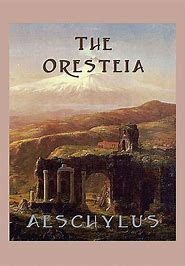Roma Mater.
We learn more about Cynan, the Mithraist convert. Expecting a comedy by Plautus at the theatre, the Romans find that, instead, Aeschlyus' Agamemnon is to be performed in an Ysan translation by Queen Bodilis. Cynan gets up to leave but is forcibly obliged to remain by the deputy, Adminius, who insists that his men make a good impression and take in some culture. In fact, Cynan is immediately impressed by authenticity and veracity when the play opens with a soldier complaining of weariness on the night watch:
"Cynan's eyes widened. 'Mithras!' he whispered. 'That's the way it is.'" (XX, 1, p. 350)
Afterwards, he wants to know more:
"'What happened next?' Cynan wanted to know. 'That Orestes they spoke of, he must have done something. Are there more plays?'
"'I've heard Greek plays go in threes,' Verica answered. 'Maybe Queen Bodilis has translated the rest. Or maybe she will.'" (pp. 350-351)
As the Andersons expect us to know, the Oresteia is the only surviving Greek dramatic trilogy. Meanwhile, we, the readers of this novel, have learned to respect Cynan.
We learn more about end-of-the-year business in Ys:
food traders at Goose Fair and the Cornmarket
horse dealers at Epona Square
flour mills
breweries
bakeries
smoking and pickling establishments
windswept Skippers' Market
fishers mending boats and seeking odd jobs
housewives lighting their homes
husbands storing firewood
Suffete social events
temple help for the poor
immemorially old rituals
In A Year In Ys, I missed one passage about the turning year:
"The full moon before autumnal equinox came early that year..." (XXI, 1, p. 357)
Queen Forsquilis leaves Ys and enters the necropolis to seek dreams in the tomb of Brennilis because:
"'...Ys is again at the end of an age. The Old is dying. Time travails with the New, and we fear Its face which we have not seen.'" (p. 358)
The year ends. That is part of a cycle. An age ends. That is another matter.

13 comments:
Kaor, Paul!
I too have read the ORESTEIA, but not any of the comedies of Plautus.
So Queen Brennilis was buried on land, but not at sea. That contradicts the later custom of sea burial!
Ad astra! Sean
Sean,
The necropolis was filled so they shifted to sea burial.
Paul.
Kaor, Paul!
That is true. The city state had only a small territory.
Ad astra! Sean
One thing Poul does bring out is how much sheer -work- living involved in the 'old days'.
I've split wood for fires, for example... but not because I -had- to.
When my father was a young man, his family's home and hotel -were- heated by wood stoves and fireplaces -- and often, not heated, and Newfoundland does not have a balmy climate.
When he was in his 80's, my father visited me and Jan, and he noticed that I'd had a tree in the yard taken down and was splitting the wood. He volunteered to help -- and I was concerned that he'd over-exert himself.
Forty minutes after we started, he was smiling while I leaned puffing and red-faced against the wall of the house.
"Steve," he said, and effortlessly split a billet. "When I was a young man I split a -lot- of wood. It's not how hard you work, it's how smart you work."
Prior to the modern era, the only way to have anything like the leisure most people in advanced countries have now was to have a bunch of other people doing the work -for- you.
IOW, there's a reason for the Biblical "hewers of wood and drawers of water" phrase.
Kaor, Mr. Stirling!
Amusing, this story about you and your father. He knew, from long hard experience, how to split wood as efficiently as possible. I sure as heck couldn't do that!
Ad astra! Sean
I've done a bit of wood splitting for a cottage and also I did some volunteer work at a Hostel on the Icefields Parkway. There was a gasoline or diesel powered wood splitter that fairly quickly split a lot of logs & we mostly just took the firewood & stacked it conveniently for the winter. I'm pretty sure the heat value of the wood was a lot more than the petroleum used to run the splitter, considering the volume of firewood we stacked.
I certainly wouldn't have the skill to split wood the way Steve's father did.
"Split atoms not wood."
As an indicator, women hit puberty in the outports on average 3-4 years later than they do now, and menopause was also earlier by a similar margin. I've seen pictures, and women in their 40's look like they're over 60 to modern eyes.
Kaor, Mr. Stirling!
If, 75 years ago, life was still so hard for many people in some parts of Canada (or the US), think of how much MORE harder it was in 1873!
WE have no right to complain about petty "hardships" or discomforts.
Ad astra! Sean
"diet was so calcium-poor"
I would expect something could be done with fish bones to get calcium into the diet.
Boil the bones for a broth?
Kaor, Jim!
But how many people were then aware of the benefits of consuming calcium? Esp. in remote parts of any country.
Ad astra! Sean
Jim: for that matter, people in Newfoundland back then refused to eat lobster, because they're bottom-feeders who ate dead fishermen.
Kaor, Mr. Stirling!
At one time lobsters were treated like trash, fit only for feeding convicted criminals!
Ad astra! Sean
Post a Comment